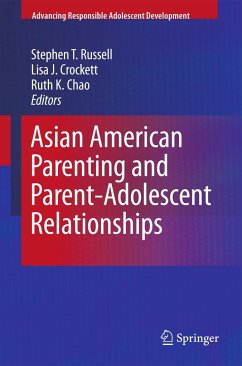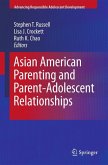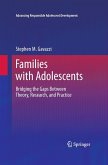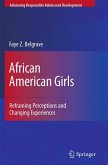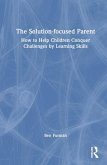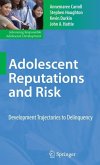The growing presence of non-European cultures in America brings new challenges to as well as opportunities for parenting research. Whereas particular constructs of parent-child relationships were once considered universal, we now recognize distinct cultural variations. This is especially true in the case of Asian Americans, a population encompassing many diverse ethnicities.
Informed by a variety of qualitative and quantitative methodologies including detailed surveys of teenagers and their parents, Asian American Parenting and Parent-Adolescent Relationships focuses on Chinese and Filipino Americans-large populations with markedly different histories and cultural influences-giving readers a new lens into the nature and meaning of cultural differences in parenting. Synthesizing data on adolescent autonomy and dependence, parental support and control (both crucial to adolescents' wellbeing), and the rarely-explored concept of parental sacrifice, this ambitious volume:
- Compares the parental belief systems of European Americans and immigrant Chinese and their influence on parenting styles.
- Discusses the role of measurement equivalence in understanding Asian American parenting practices.
- Examines sacrifice as a central concept in Asian American parenting and in immigrant parenting in general.
- Analyzes how Asian American teenagers understand the support and control provided by their parents.
- Explores the dynamics of parent and child gender in Asian American parenting.
- Places these findings in the context of previous parenting research and identifies new directions for the field.
Asian American Parenting and Parent-Adolescent Relationships is a uniquely informative reference for researchers, clinicians, and graduate students across multiple disciplines, including developmental, clinical child, and school psychology, sociology, and anthropology as well as ethnic and women's studies.
"A much needed and extremely thoughtful contribution to the scholarship on Asian American families. The authors rely on a variety of research methods to reveal patterns that challenge stereotypes and urge us to move beyond pan ethnic categories and explore the rich diversity among Asian Americans. This book is an exemplary study of culture and parenting." (Niobe Way, President, Society for Research on Adolescence / Professor of Applied Psychology, New York University)
The relationships between children and their parents are the building blocks for f- ily relationships throughout life. The nature of the parent-child relationship begins with parenting-the practices and strategies that parents engage in as they raise their children. Parenting during childhood sets the stage for parent-adolescent relati- ships. These relationships make a critical difference during the teenage years: we know that when parent-adolescent relationships are healthy and strong, adolescents are more likely to have high aspirations and achievement, and to make healthier choices when it comes to risk-taking. Most of the research in this ?eld has been based in the United States and has been conducted through studies of European American families. Yet a growing body of research suggests important ethnic differences in styles of parenting and the qua- ties characterizing the parent-adolescent relationship. In this area of research, most existing studies have examined ethnic and cultural group differences using widely accepted measures and concepts of parenting. Comparative studies assume that dimensions of parenting such as parental warmth or control have the same meaning across cultures; however, given that conceptualizations of adolescent-parent re- tionships have been developed and tested on samples comprised largely of European Americans, we cannot rule out the possibility that the way we understand parenting has been shaped by the predominantly Western- and U. S. -focused research in this ?eld.
Informed by a variety of qualitative and quantitative methodologies including detailed surveys of teenagers and their parents, Asian American Parenting and Parent-Adolescent Relationships focuses on Chinese and Filipino Americans-large populations with markedly different histories and cultural influences-giving readers a new lens into the nature and meaning of cultural differences in parenting. Synthesizing data on adolescent autonomy and dependence, parental support and control (both crucial to adolescents' wellbeing), and the rarely-explored concept of parental sacrifice, this ambitious volume:
- Compares the parental belief systems of European Americans and immigrant Chinese and their influence on parenting styles.
- Discusses the role of measurement equivalence in understanding Asian American parenting practices.
- Examines sacrifice as a central concept in Asian American parenting and in immigrant parenting in general.
- Analyzes how Asian American teenagers understand the support and control provided by their parents.
- Explores the dynamics of parent and child gender in Asian American parenting.
- Places these findings in the context of previous parenting research and identifies new directions for the field.
Asian American Parenting and Parent-Adolescent Relationships is a uniquely informative reference for researchers, clinicians, and graduate students across multiple disciplines, including developmental, clinical child, and school psychology, sociology, and anthropology as well as ethnic and women's studies.
"A much needed and extremely thoughtful contribution to the scholarship on Asian American families. The authors rely on a variety of research methods to reveal patterns that challenge stereotypes and urge us to move beyond pan ethnic categories and explore the rich diversity among Asian Americans. This book is an exemplary study of culture and parenting." (Niobe Way, President, Society for Research on Adolescence / Professor of Applied Psychology, New York University)
The relationships between children and their parents are the building blocks for f- ily relationships throughout life. The nature of the parent-child relationship begins with parenting-the practices and strategies that parents engage in as they raise their children. Parenting during childhood sets the stage for parent-adolescent relati- ships. These relationships make a critical difference during the teenage years: we know that when parent-adolescent relationships are healthy and strong, adolescents are more likely to have high aspirations and achievement, and to make healthier choices when it comes to risk-taking. Most of the research in this ?eld has been based in the United States and has been conducted through studies of European American families. Yet a growing body of research suggests important ethnic differences in styles of parenting and the qua- ties characterizing the parent-adolescent relationship. In this area of research, most existing studies have examined ethnic and cultural group differences using widely accepted measures and concepts of parenting. Comparative studies assume that dimensions of parenting such as parental warmth or control have the same meaning across cultures; however, given that conceptualizations of adolescent-parent re- tionships have been developed and tested on samples comprised largely of European Americans, we cannot rule out the possibility that the way we understand parenting has been shaped by the predominantly Western- and U. S. -focused research in this ?eld.
"A much needed and extremely thoughtful contribution to the scholarship on Asian American families. The authors rely on a variety of research methods to reveal patterns that challenge stereotypes and urge us to move beyond pan ethnic categories and explore the rich diversity among Asian Americans. This book is an exemplary study of culture and parenting."
(Niobe Way, President, Society for Research on Adolescence / Professor of Applied Psychology, New York University)
"In Asian American Parenting and Parent-Adolescent Relationships, Stephen Russell, Lisa Crockett and Ruth Chao have garnered a wealth of information on Asian American youth and their families, especially Chinese and Filipino Americans, and provided readers with exceptional insight into parenting influenced by cultural differences. .... The book is a highly informative reference for researchers, clinicians, and graduate students across multiple disciplines, including developmental, clinical, child, and school psychology, sociology, and anthropology as well as ethnic and women's studies. ... It is fascinating to understand how parenting goals, style and warmth are tinted by the colors of culture."
(Prathiba Nagabhushan, in Journal of Youth and Adolescence)
(Niobe Way, President, Society for Research on Adolescence / Professor of Applied Psychology, New York University)
"In Asian American Parenting and Parent-Adolescent Relationships, Stephen Russell, Lisa Crockett and Ruth Chao have garnered a wealth of information on Asian American youth and their families, especially Chinese and Filipino Americans, and provided readers with exceptional insight into parenting influenced by cultural differences. .... The book is a highly informative reference for researchers, clinicians, and graduate students across multiple disciplines, including developmental, clinical, child, and school psychology, sociology, and anthropology as well as ethnic and women's studies. ... It is fascinating to understand how parenting goals, style and warmth are tinted by the colors of culture."
(Prathiba Nagabhushan, in Journal of Youth and Adolescence)

